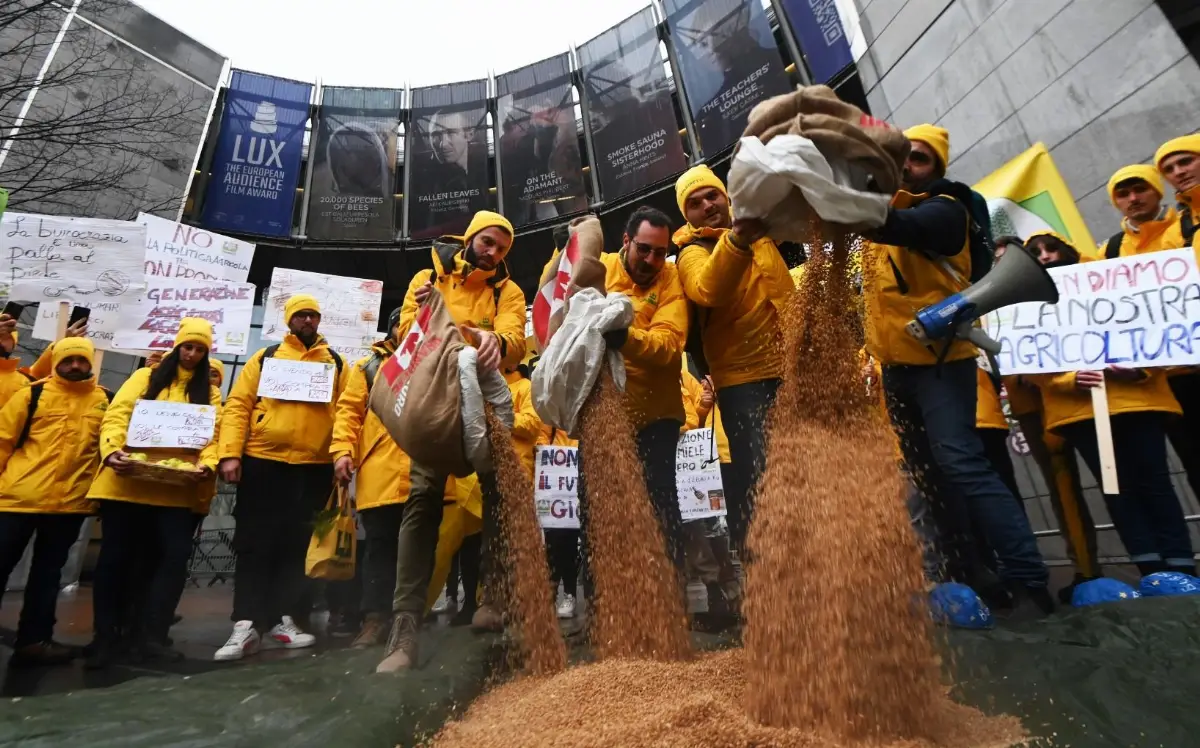
Italian famers from Brussels: EU invaded by foreign food. Record imports at 65 billion
From Putin's wheat to Canadian wheat to glyphosate, an attack on Italian agri-food heritage

Prandini (Coldiretti): "We ask for a clear stop to the entry of products from outside the EU borders that do not respect our own standards, guaranteeing the principle of reciprocity of the rules"
From Putin 's wheat to Canadian wheat dried with glyphosate, so much foreign food has never arrived in Italy, with the value of agri-food imports from abroad reaching a record 65 billion euros in 2023. Products often come from countries that do not respect the same food and environmental safety rules and respect for workers' rights. This was reported by Coldiretti on the basis of Istat data on the occasion of the protest in Brussels with thousands of farmers led by President Ettore Prandini, who took to the streets with a procession arriving a few steps from the European Parliament, where the Council of Agricultural Ministers is being held.
“We ask that on imports there be a clear stop to the entry of products from outside the EU borders that do not respect our own standards, guaranteeing the principle of reciprocity of the rules, since we can no longer tolerate this unfair competition, which puts the health of citizens and the survival of agricultural businesses - states Prandini -. We need to work to increase agricultural production by acting on the innovation front, with new genetic improvement technologies to recover production not only in terms of sustainability, but also in quantitative terms and in terms of supply chain contracts, which are fundamental for increasing the level of aggregation of the offer, characterizing and qualitatively enhancing the national product".
A real attack on Italy's agri-food heritage favored by European follies which cause national agricultural production to decline, pushing - underlines Coldiretti - the food deficit of the country which has managed to produce just 36% of the soft wheat it needs, 53 % of corn, 51% of beef, 56% of durum wheat for pasta, 73% of barley, 63% of pork and cured meats, 49% of goat and sheep meat while for milk and cheeses we reach 84% self-sufficiency.
The symbolic product of this invasion is undoubtedly wheat. In Italy in 2023, imports of cereals from Canada treated with glyphosate in ways prohibited at national level have more than doubled for a total of well over a billion kilos - reports Coldiretti. But if the country of maple remains the main supplier, the real invasion that marked 2023 is that of Russian and Turkish wheat, which increased respectively by +1164% and +798% according to an analysis published by the Divulga Study Center. A phenomenon never recorded in the history of our country, which has significantly reduced the prices of the Italian product. But there are also subsidized trade agreements that bring into Italy products often grown with the use of pesticides banned in the European Union - continues the association -, which create unfair competition with Italian products, depress the prices paid to producers and represent a threat to the health of citizens. They range from Asian rice which is grown using tricyclazole, a powerful pesticide banned in the European Union since 2016, but enters Italy thanks to the zero duty, to Canadian lentils, also dried with glyphosate, which represent 2/3 of the total imported into our country.
Then there are Egyptian oranges, the subject of notifications from the Rassf, the EU rapid alert system, due to the presence of Chlorpyrifos, a pesticide banned in the European Union since 2020; Turkish hazelnuts which are also accused by the United States Department of Labor of being grown with the exploitation of child labor; Argentine lemons grown using pesticides including propiconazole, banned since 2019. Without forgetting Chinese tomato paste which costs half as much as the Italian one thanks to the exploitation of political prisoners and drives down the prices of the national product.
Foreign foods and drinks are over ten times more dangerous than those made in Italy, with the number of agri-food products with irregular chemical residues exceeding the legal limits which in Italy was equal to 6.4% in imported products, compared to the average of 0.6% of samples of national origin, according to data from the latest report published by EFSA in 2023 relating to national data on pesticide residues.
There also remains the threat of the Mercosur agreement, the common market of South America which includes Argentina, Brazil, Paraguay and Uruguay, with the serious failures of many South American countries in terms of the sustainability of agri-food production with risks for the environment, food safety and the exploitation of child labor highlighted by the US Department of Labor itself.
EFA News - European Food Agency